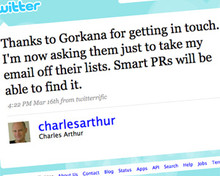
"No, PR agency for ELSPA, I haven't time to send you an email detailing when, what and where on story involving ELSPA. Offer a human, dammit," he scathingly tweeted yesterday.
Earlier this week, PR consultant Craig McGill reported that Arthur is removing his email address from Gorkana's list and asking for PR pitches by Twitter instead.
The idea is PRs will publicly send their requests via an '@' message and Arthur will respond if he feels it is relevant.
"You have to remember that the relationship between journalists and PRs isn't quite as symmetrical as you might think," Arthur tells Journalism.co.uk.
"Journalists aren't paying the PRs' bills - it's the clients who are hiring the PRs, so the PRs have an interest in trying to reach as many journalists as they possibly can, get as many people to hear the message as they can, in the vague hope they get as wide a benefit for their client as they can. For the journalist, they have a much narrower focus, thinking about who their readers are.
"PRs are to journalists, what car manufacturers are to car suppliers," he says, an analogy he has written about on his blog.
"Both are reliant on the other: the manufacturers feel the pain if suppliers, for whatever reason, fail. The suppliers are driven mad if manufacturers deny them business," he writes in the post.
Arthur is fed up of the junk email that builds up from PRs who don't know what he does: "Why would someone include me on a mail out about something we've [The Guardian] never written about or we are ever going to write about?
"They [PRs] send out the email without thinking why they're sending it out. To them, it's a ritual almost. There's basically a disconnect between what their job is, which is to get coverage for their client, and what our job is."
In addition PR companies will frequently tell clients they can secure coverage at certain titles, because they have contacts there. But, says Arthur, if newspapers don't then write about it, 'clients buy into it and are disappointed'.
There are so few technology correspondents on Fleet Street, he says, it would not be difficult for PRs to target him in a more nuanced and educated way.
With the removal of his email from Gorkana's database he hopes to reduce the level of spam: "PRs were not looking past the fact they had 500 names they could email out to."
PR email has become 'as bad a spam tool as someone sending out adverts for Viagra, and I don't buy that either', he adds.
"There are some companies we're never going to write about and, to some extent, they have to just accept that," he says.
Arthur would much rather spend his time hunting for his own stories and while some journalists do over-use press releases for speed and space-filling, 'thinking is evolving on that', he says.
The Guardian is not overly reliant on PR, he claims, a situation made easier 'when you work for an organisation which puts a premium on generating your own stories and making the news agenda yourself'.
Arthur also doesn't attempt to cover everything on his 'patch': "If I see a story on another newspaper site I don't feel the need to leap up and go and rewrite them.
"I often say: is this something that really deserves me spending my time on? Or should I be doing something that [fits in with] the Guardian's agenda, and what we're trying to achieve with our technology coverage?"
PRs or press offices are often just needed for a response, he says, citing the Guardian's Tax Gap investigation and a front page story he ran for last week's technology supplement, looking at the government's expenditure on a speech analysis system.
Through original journalism like this, Arthur says, more whistleblowers will come forward and the Guardian 'will get more stories this way'. The 'good old brown envelope works pretty well still' and 'most good stories don't come from PR,' he adds.
While the Twitter method means that PRs have to reveal details of their announcements publicly, 'if it's that good a story they'll find a way to get it to me,' Arthur says.
Free daily newsletter
If you like our news and feature articles, you can sign up to receive our free daily (Mon-Fri) email newsletter (mobile friendly).
Related articles
- 200 speakers you need at your next journalism event to avoid all-male panels
- Five key takeaways from the UK select committee on the future of news
- Standing out in a crowded market: what makes a top news podcast?
- Guardian launches a new section for readers in Europe
- Five tips for reporting on the UK Home Office









